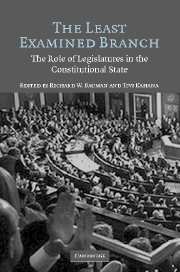Book contents
- Frontmatter
- Contents
- Foreword: Legislatures in the Constitutional State by Amy Gutmann
- Contributors
- New Ways of Looking at Old Institutions
- PART ONE LEGISLATURES AND DEMOCRATIC THEORY
- 1 Principles of Legislation
- 2 An Exact Epitome of the People
- 3 Political Accountability, Proxy Accountability, and the Democratic Legitimacy of Legislatures
- 4 Constitutionalism, Trade Legislation, and “Democracy”
- PART TWO LEGISLATING AND DELIBERATING IN THE DEMOCRATIC LEGISLATURE
- PART THREE CONSTITUTION MAKING BY LEGISLATURES: THE EXPLICIT VERSION
- PART FOUR CONSTITUTION MAKING BY LEGISLATURES: THE IMPLICIT VERSION
- PART FIVE CONSTITUTIONAL INTERPRETATION AND APPLICATION BY THE LEGISLATURE
- PART SIX IS LEGISLATIVE CONSTITUTIONALISM POSSIBLE?
- PART SEVEN THE LEGISLATURE IN DIALOGUE: DOMESTIC AND INTERNATIONAL CONTEXTS
- Index
3 - Political Accountability, Proxy Accountability, and the Democratic Legitimacy of Legislatures
Published online by Cambridge University Press: 06 August 2009
- Frontmatter
- Contents
- Foreword: Legislatures in the Constitutional State by Amy Gutmann
- Contributors
- New Ways of Looking at Old Institutions
- PART ONE LEGISLATURES AND DEMOCRATIC THEORY
- 1 Principles of Legislation
- 2 An Exact Epitome of the People
- 3 Political Accountability, Proxy Accountability, and the Democratic Legitimacy of Legislatures
- 4 Constitutionalism, Trade Legislation, and “Democracy”
- PART TWO LEGISLATING AND DELIBERATING IN THE DEMOCRATIC LEGISLATURE
- PART THREE CONSTITUTION MAKING BY LEGISLATURES: THE EXPLICIT VERSION
- PART FOUR CONSTITUTION MAKING BY LEGISLATURES: THE IMPLICIT VERSION
- PART FIVE CONSTITUTIONAL INTERPRETATION AND APPLICATION BY THE LEGISLATURE
- PART SIX IS LEGISLATIVE CONSTITUTIONALISM POSSIBLE?
- PART SEVEN THE LEGISLATURE IN DIALOGUE: DOMESTIC AND INTERNATIONAL CONTEXTS
- Index
Summary
The story of democratic legitimacy that has long dominated American legal discourse is familiar and very simple: Legislators are politically answerable to voters and appointed judges are not. This accountability is conventionally said to supply the dispositive factor in allocating institutional roles. The idea that policymaking and political accountability must travel together forms the intellectual core of this idea and gives meaning to the derisive references to “legislation from the bench” that are so common in contemporary politics. To put the idea on a loftier academic plane, consider the words of Alexander Bickel, the patron saint of the so-called countermajoritarian difficulty:
Representative democracies – that is to say all working democracies – function by electing certain men for certain periods of time, then passing judgment periodically on their conduct of public office. It is a matter of laying on of hands, followed in time by a process of holding to account – all through the exercise of the franchise.
Notice some significant characteristics of this approach. One is a single-minded democratic focus on periodic elections. This is characteristic of an approach that some have called “democratic minimalism,” which requires only “choosing rulers by elections,” and no more. Echoing in some respects theories associated with Joseph Schumpeter, this conception of democracy rejects theories that demand robust concepts of deliberation, participation, equality, or justice as aspects of democracy itself.
- Type
- Chapter
- Information
- The Least Examined BranchThe Role of Legislatures in the Constitutional State, pp. 45 - 75Publisher: Cambridge University PressPrint publication year: 2006
- 2
- Cited by



